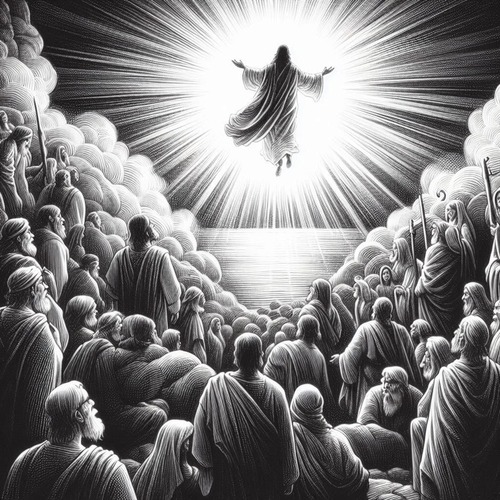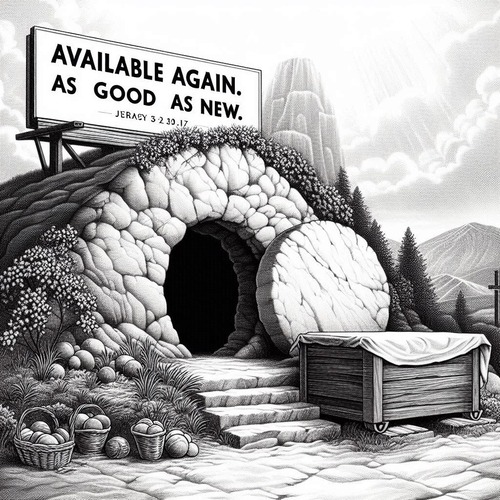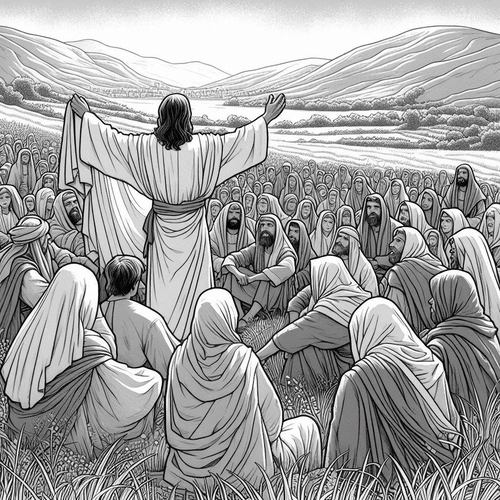High and Lifted Up: Why the Ascension Truly Matters
In the grand narrative of Christ’s redemptive work, one crucial event often lives in the shadow of the cross and resurrection: the Ascension. We commemorate Good Friday with solemnity and celebrate Easter with jubilation, yet most believers barely acknowledge Ascension Day. From a Reformed perspective, however, Christ’s ascension isn’t merely His departure from earth but His coronation as the reigning King of kings.
THE BIBLICAL ACCOUNT
Scripture presents the Ascension with remarkable clarity. Luke, our most detailed chronicler of this event, describes it twice: Luke 24:50-51 and Acts 1:9-11.
Mark likewise records, “After the Lord Jesus had spoken to them, he was taken up into heaven and he sat at the right hand of God” (Mark 16:19). This final phrase—”sat at the right hand of God”—is crucial for understanding the Ascension’s significance.
The Old Testament had long prepared for this moment. In Psalm 68:18, David prophesied: “When you ascended on high, you took many captives.” Even more significantly, Psalm 110:1 foretold: “The LORD says to my lord: ‘Sit at my right hand until I make your enemies a footstool for your feet.'” This psalm, quoted more frequently in the New Testament than any other Old Testament passage, finds its fulfillment in Christ’s ascension.
WHY THE ASCENSION TRULY MATTERS IN THEOLOGY SIGNIFICANCE
From a Reformed perspective, the Ascension represents at least four crucial realities:
- Christ’s exaltation and coronation: The Apostle Paul describes how God “raised Christ from the dead and seated him at his right hand in the heavenly realms, far above all rule and authority, power and dominion” (Ephesians 1:20-21). Through the Ascension, Jesus assumes His rightful place of authority over all creation.
- The completion of Christ’s redemptive work: The author of Hebrews declares that “after he had provided purification for sins, he sat down at the right hand of the Majesty in heaven” (Hebrews 1:3). This “sitting down” signifies the completion of His sacrificial work. Unlike the Old Testament priests who stood continually to offer repeated sacrifices, Christ’s work is finished.
- The inauguration of His heavenly reign: Peter affirms that Christ “has gone into heaven and is at God’s right hand—with angels, authorities and powers in submission to him” (1 Peter 3:22). The Ascension marks the beginning of Christ’s heavenly kingship.
- The sending of the Holy Spirit: Jesus Himself linked these events: “It is for your good that I am going away. Unless I go away, the Advocate will not come to you; but if I go, I will send him to you” (John 16:7). At Pentecost, Peter explicitly connects the outpouring of the Spirit to Christ’s ascension: “Exalted to the right hand of God, he has received from the Father the promised Holy Spirit and has poured out what you now see and hear” (Acts 2:33).
WHY THE ASCENSION TRULY MATTERS: REFORMED PERSPECTIVES
Reformed theology has particularly emphasised the Ascension’s significance. John Calvin saw Christ’s ascension as His assuming the throne of universal dominion. In his Institutes, Calvin writes, Christ “was received up into heaven to rule the universe with greater right and authority… and to be present with believers by his grace and power.”
Contemporary Reformed scholar Patrick Schreiner highlights how the Ascension represents Christ’s enthronement. In his work on Christ’s kingship, Schreiner argues the Ascension is the moment when Jesus formally takes His seat on the cosmic throne, fulfilling the Davidic covenant’s promise of an eternal kingdom.
Herman Bavinck, the Dutch Reformed theologian, emphasised the cosmic significance of the Ascension. For Bavinck, Christ’s ascension declares His lordship not just over the church but over all creation. The implications are far-reaching: every sphere of human activity falls under Christ’s sovereign rule.
Geerhardus Vos connected the Ascension particularly to Christ’s heavenly priesthood. According to Vos, Christ’s entrance into heaven’s sanctuary enables Him to serve as our High Priest, interceding perpetually on our behalf.
PRACTICAL IMPLICATIONS
Far from being a mere historical curiosity, Christ’s ascension profoundly shapes Christian life:
We have a perpetual intercessor: Paul reminds us that Christ “is at the right hand of God and is also interceding for us” (Romans 8:34). The author of Hebrews elaborates: “He is able to save completely those who come to God through him, because he always lives to intercede for them” (Hebrews 7:25). Our prayers reach a Saviour who understands our weaknesses and represents us before the Father.
Robert Murray M’Cheyne, the beloved Scottish Reformed pastor, captured the comfort of Christ’s ongoing intercession with these stirring words: “If I could hear Christ praying for me in the next room, I would not fear a million enemies…” Though we cannot physically hear His voice, what profound assurance it is for us to know the ascended Christ is indeed interceding for us—with even greater efficacy than if He were just beyond the wall.
We anticipate His return: The angels’ promise that Jesus “will come back in the same way you have seen him go into heaven” (Acts 1:11) grounds our hope in His physical return. The ascended Christ will one day descend in glory.
We cultivate heavenly-mindedness: Paul exhorts believers: “Since, then, you have been raised with Christ, set your hearts on things above, where Christ is, seated at the right hand of God” (Colossians 3:1). Christ’s ascension reorients our perspective from earthly concerns to heavenly realities.
We participate in His mission: Before ascending, Jesus declared, “All authority in heaven and on earth has been given to me. Therefore go and make disciples of all nations” (Matthew 28:18-19). The Great Commission flows directly from Christ’s ascended authority.
CONCLUSION: WHY THE ASCENSION TRULY MATTERS
The Ascension completes Christ’s earthly ministry and inaugurates His heavenly reign. It isn’t an epilogue to the gospel story but a crucial chapter that connects Christ’s first coming with His eventual return. When we grasp Jesus is currently enthroned as the cosmic King, it transforms how we understand both our present trials and our future hope.
In a world of competing powers and authorities, the Ascension reminds us where ultimate authority resides. In our personal struggles, it assures us we have an advocate who has experienced humanity firsthand. In our mission, it empowers us with the certainty that we serve a King whose victory is already secured.
The ascended Christ—high and lifted up—truly matters for every aspect of our faith and life. As we lift our eyes to the One seated at the Father’s right hand, we discover new depths to the confession: “Jesus Christ is Lord.”
WHY THE ASCENSION TRULY MATTERS: RELATED FAQs
What is Christ asking on our behalf when He is interceding for us? Scripture doesn’t give us a transcript of Christ’s intercession, but based on passages such as John 17, Christ likely prays for our perseverance in faith, our protection from evil, our unity with other believers, and our ultimate glorification. His intercession ensures the salvation He purchased on the cross is applied fully to our lives, meeting our specific needs in real-time with perfect wisdom.
- Wasn’t it better for us to have Christ’s physical presence remain with us, than Him going away? Jesus Himself said, “It is for your good that I am going away” (John 16:7). While His physical presence was limited to one location, His ascension enabled the sending of the Holy Spirit to indwell all believers everywhere simultaneously. Additionally, from heaven, Christ can exercise His universal authority and mediate directly in the Father’s presence on our behalf.
- Doesn’t Romans 1:4 tell us Christ was effectively enthroned at His resurrection, rather than following His ascension? Romans 1:4 indeed states Jesus was “declared with power to be the Son of God by his resurrection from the dead.” The resurrection vindicated Christ’s identity and claims, demonstrating His victory over death. However, Reformed theology typically sees this as the first stage of the exaltation, with the Ascension representing His formal installation to His heavenly throne and the full assumption of His mediatorial kingship.
How does Christ’s humanity relate to His ascension? Christ ascended in His glorified human body, meaning our human nature is now seated at God’s right hand. This affirms the dignity of human nature, assures us that Christ understands our human experience, and guarantees our own bodily resurrection. As Calvin emphasised, Christ remains fully human in heaven, albeit in a glorified state.
- Does the Ascension have implications for creation care? Absolutely. Christ’s ascension affirms His lordship over all creation, not just human souls. Since the ascended Christ claims the entire cosmos as His kingdom, Christians should value and steward the created order as belonging to their King. This cosmic dimension of the Ascension reminds us Christ’s redemptive purposes extend to the renewal of all creation (Romans 8:19-22).
- What is the relationship between the Ascension and our worship? The Ascension transforms our understanding of worship. As our Great High Priest who has “passed through the heavens” (Hebrews 4:14), Christ leads us into the Father’s presence. Our earthly worship joins with the heavenly worship already in progress. This is why many Reformed liturgies emphasise being “lifted up” into heavenly places during worship.
How should the Ascension shape our view of current events and political realities? The Ascension declares that Christ is already enthroned above every earthly ruler and authority (Ephesians 1:20-22). This gives Christians perspective on political and social developments, reminding us no earthly can ultimately prevail against Christ’s kingdom. While we engage responsibly in civic life, our ultimate allegiance and hope rest in the already-reigning King Jesus.
WHY THE ASCENSION TRULY MATTERS: OUR RELATED POSTS
Editor's Pick

The Throne-Room Vision: Who Did Isaiah See?
The scene is unforgettable: Isaiah stands in the temple, and suddenly the veil between heaven and earth tears open. He [...]

The Angel of the Lord: Can We Be Certain It Was Christ All Along?
Throughout the Old Testament, a mysterious figure appears: the Angel of the LORD. He speaks as God, bears God’s name, [...]
SUPPORT US:
Feel the Holy Spirit's gentle nudge to partner with us?
Donate Online:
Account Name: TRUTHS TO DIE FOR FOUNDATION
Account Number: 10243565459
Bank IFSC: IDFB0043391
Bank Name: IDFC FIRST BANK






